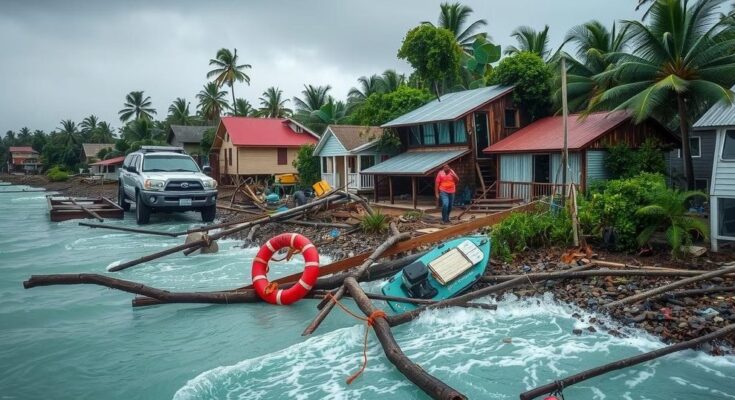Cyclone Chido has caused catastrophic destruction in Mayotte, with officials fearing hundreds or possibly thousands of deaths. Emergency teams from France are mobilizing to provide aid, as the cyclone has severely damaged infrastructure, including homes and the airport. The need for international assistance and recovery efforts is crucial as the community begins to assess the full extent of the disaster.
The French territory of Mayotte has experienced catastrophic devastation due to Cyclone Chido, with government officials estimating the death toll to be in the hundreds and potentially reaching into the thousands. François-Xavier Bieuville, the Prefect of Mayotte, reported that the cyclone, described as the worst to impact the island in 90 years, has resulted in widespread destruction of public infrastructure, including homes and the airport, complicating rescue efforts. France has mobilized teams and supplies to assist in humanitarian relief in response to the overwhelming damage and significant risk to the local population, particularly in the impoverished slums that characterize much of Mayotte.
Cyclone Chido unleashed winds exceeding 220 kilometers per hour, directly affecting Mayotte while also impacting neighboring regions, including Comoros and Madagascar. Authorities have noted the ongoing inability to determine the full scale of human loss due to the destruction caused by the cyclone, with the French Interior Ministry initially reporting at least 11 fatalities and over 250 injuries, which is anticipated to rise as rescue operations continue.
As the relief efforts unfold, French President Emmanuel Macron expressed his condolences, stating that he is with the people of Mayotte during this tragic time. Emergency support is being coordinated, with plans to establish an air and sea bridge for aid deliveries, targeting critical needs such as the restoration of electricity and potable water access. In the face of these challenges, the prognosis remains grim as the full impact of the cyclone continues to reveal itself in the affected communities.
In subsequent reports, the extent of devastation is becoming increasingly clear, with entire neighborhoods flattened and urgent calls for international assistance growing louder, emphasizing the pressing realities of climate change which have led to an increased frequency of destructive cyclones in the region. The local populace remains at risk, with concerns about potential outbreaks of waterborne diseases following the catastrophe, further exacerbating the humanitarian crisis.
Cyclone Chido has significantly impacted Mayotte, one of France’s overseas territories located in the Indian Ocean. Known for its socio-economic challenges, Mayotte is among the poorest regions within the European Union, housing approximately 300,000 residents. The cyclone is part of a broader pattern of increasingly severe weather phenomena attributed to climate change. Recent years have seen a rise in cyclone intensity in southern Africa, prompting concerns from humanitarian organizations regarding the long-term implications for local populations, particularly in terms of public health and infrastructure recovery. Historically, devastating cyclones in the region have resulted in extensive loss of life and long-lasting socio-economic ramifications.
The devastation wrought by Cyclone Chido in Mayotte highlights the urgent need for swift humanitarian efforts and international support to address the immediate needs of the affected population. With an estimated death toll of several hundred, alongside severe infrastructure damage, the situation is dire. The ongoing challenge will be to manage both immediate relief efforts and the longer-term recovery needed for the impoverished residents of Mayotte, who are often at the mercy of extreme weather exacerbated by climate change. Immediate attention to both health and infrastructure needs will be essential in the aftermath of this disaster.
Original Source: www.cbsnews.com




